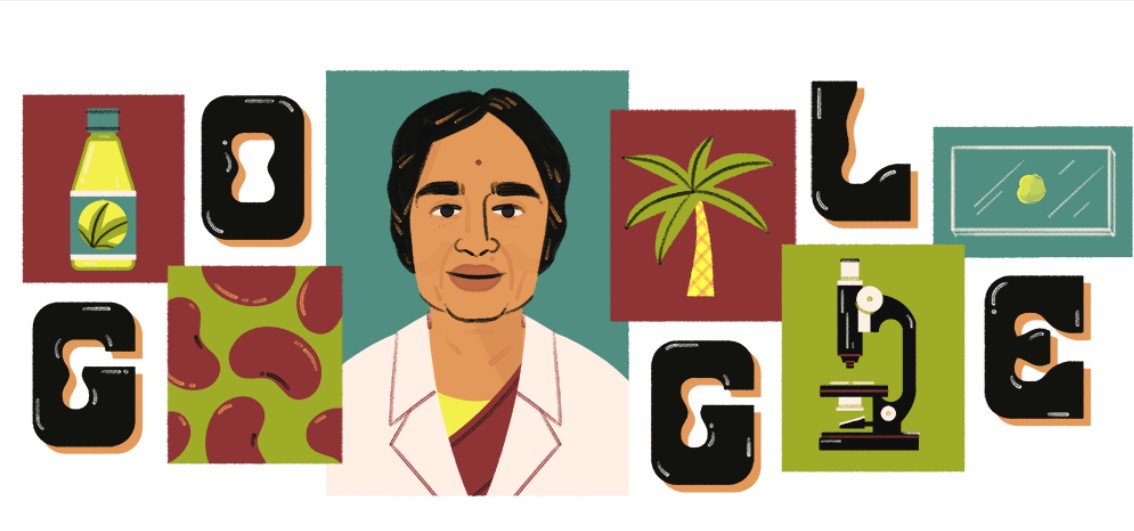Dr. Kamala Sohonie truly deserves a Google Doodle. In a symphony of scientific brilliance and tenacity, the resounding tribute of today’s Google Doodle harmonizes with the world as it celebrates the extraordinary life and unparalleled achievements of Dr. Kamala Sohonie.
Amidst an era where Indian women faced towering obstacles in the pursuit of scientific knowledge, Dr. Sohonie emerged as an awe-inspiring force, shattering glass ceilings and etching her name in golden letters as the first Indian woman to conquer the elusive Ph.D. in a scientific field.
Born on this momentous day in 1911 in Indore, Madhya Pradesh, her unparalleled excellence propelled her to remarkable heights, leaving an indelible mark on the annals of biochemistry and pioneering a path for generations of aspiring Indian women to surmount gender bias and embrace their dreams.
Fueling her journey with an unwavering ambition, Dr. Kamala Sohonie embarked on a transformative academic odyssey at Bombay University, where she set the stage ablaze with her unmatched intellect and insatiable curiosity. Immersed in the captivating realms of chemistry and physics, she soared to unparalleled heights, emerging as the torchbearer of her class and earning the coveted distinction of graduating at the pinnacle of excellence in 1933.
As her academic prowess radiated like a guiding star, the Indian Institute of Science (IISc) beckoned her, yet a cloud of skepticism veiled her path. Determined to prove her mettle, Dr. Sohonie fearlessly faced the relentless doubts of the institution’s director, surmounting arduous conditions imposed upon her. Undeterred by adversity, her brilliance radiated like a supernova, leaving the director awe-struck and paving the way for a seismic shift in the institute’s mindset, heralding the acceptance of more women into the hallowed halls of scientific exploration.
With her boundless intellect unleashed, Dr. Kamala Sohonie embarked on a captivating scientific quest, unraveling the mysteries of legume proteins and their potential to nurture the bodies and minds of children. Like an alchemist of nutrition, she meticulously studied these vital building blocks of sustenance, unearthing their extraordinary ability to bolster the health and well-being of young ones.
In a watershed moment of academic triumph, she penned her groundbreaking thesis on this revolutionary subject, cementing her mastery and earning a master’s degree in 1936. Her expertise illuminated the path to a future where nutrition and scientific innovation converged, forever transforming the landscape of child health and nourishment.
Dr. Sohonie’s unwavering dedication and pioneering research would serve as a cornerstone for generations of scientists to build upon, solidifying her place as a visionary trailblazer in the annals of biochemistry.
A beacon of intellectual prowess, Dr. Sohonie’s remarkable journey ventured beyond borders as she secured a coveted research scholarship at the prestigious Cambridge University.
In the hallowed halls of this esteemed institution, she embarked on a quest that would redefine the scientific landscape. With relentless determination and an insatiable thirst for knowledge, she delved into the intricate complexities of cellular energy generation, unveiling the elusive Cytochrome C—an enzyme that danced within the very essence of plant cells.
Astoundingly, her tireless efforts and unwavering focus culminated in the completion of her doctoral thesis, a tour de force achievement that propelled her into the pantheon of scientific luminaries.
In just 14 months, Dr. Sohonie emerged as the first Indian woman to be adorned with the coveted Ph.D. accolade, an extraordinary feat that etched her name into the annals of scientific excellence and heralded a new era of possibilities for women in academia. Armed with her revolutionary discoveries, she returned to India, ready to leave an indelible mark on her homeland and transform lives through scientific ingenuity.
The incredible Legacy of Dr. Kamala Sohonie
Dr. Kamala Sohonie’s journey is a testament to her unwavering determination, exceptional intellect, and groundbreaking contributions to the field of biochemistry. Born in 1911 in Indore, Madhya Pradesh, she defied societal expectations and became the first Indian woman to earn a Ph.D. in a scientific field. Despite facing discriminatory conditions at the Indian Institute of Science, her brilliance shattered stereotypes and paved the way for more women to pursue scientific careers.
Her academic excellence began at Bombay University, where she graduated at the top of her class in 1933. Driven by a passion for knowledge, she conducted groundbreaking research on legume proteins, highlighting their potential to enhance nutrition in children. Her influential thesis earned her a master’s degree in 1936 and set the stage for her future accomplishments.
A research scholarship at Cambridge University beckoned Dr. Sohonie, where she made a groundbreaking discovery: Cytochrome C, an enzyme crucial for energy generation in plant cells. In just 14 months, she completed her doctoral thesis, becoming the first Indian woman to earn a Ph.D. in a scientific field. This milestone not only solidified her status as a trailblazer but also opened doors for countless women in academia.
Upon returning to India, Dr. Sohonie continued her remarkable work, focusing on the development of Neera, a dietary supplement derived from palm nectar. This nutritious elixir, rich in Vitamin C, has proven effective in improving the health of malnourished children and expectant mothers. Her dedication and innovation garnered her the prestigious Rashtrapati Award and positioned her as the first female director of the Royal Institute of Science in Bombay.
Dr. Kamala Sohonie’s legacy is one of inspiration and empowerment. Her pioneering achievements shattered gender barriers, leaving an indelible mark on the scientific community and providing a path for future generations to overcome bias and pursue their dreams. Her unwavering commitment to scientific exploration and her profound impact on nutrition and child health continue to resonate, making her a beacon of excellence and a true pioneer in the world of biochemistry.






